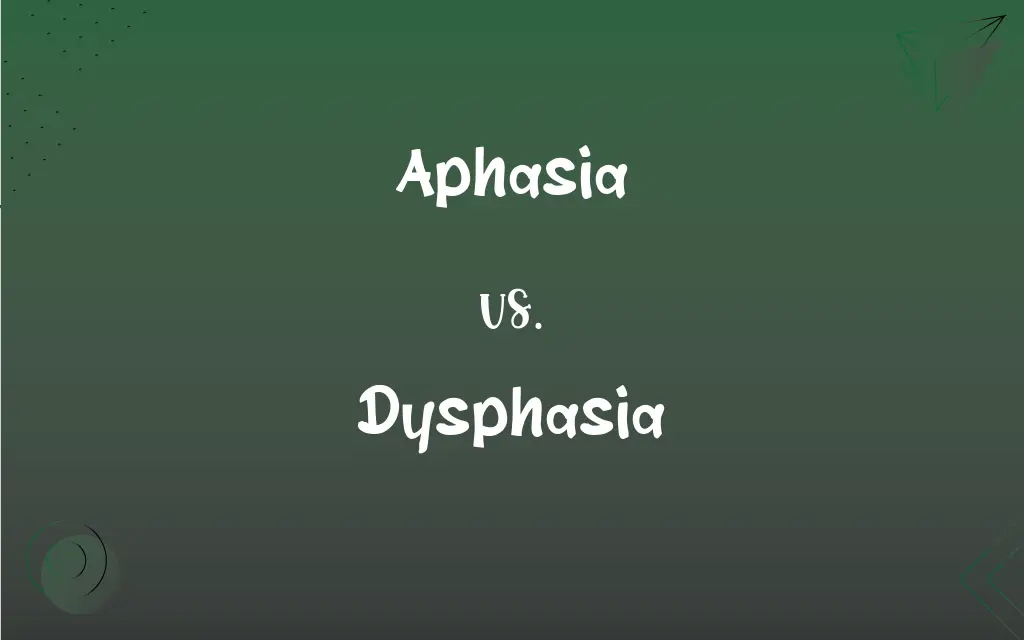Aphasia vs. Dysphasia: What's the Difference?
Edited by Aimie Carlson || By Harlon Moss || Updated on October 30, 2023
Aphasia is a complete loss of language abilities, while dysphasia is a partial loss or impairment of language abilities.

Key Differences
Aphasia is a condition characterized by the complete loss of language abilities, typically resulting from damage to specific areas of the brain. Dysphasia, on the other hand, is a partial loss or impairment of language abilities, which can also result from brain damage. Aphasia can affect speaking, understanding, reading, and writing, while dysphasia may only affect one or some of these areas.
Aphasia and dysphasia are both conditions that affect language abilities, but the severity and extent of the impairment differ. Aphasia is a more severe form of language impairment, while dysphasia is less severe. Aphasia can be caused by stroke, head injury, or other brain damage, and dysphasia can also be caused by these factors. Treatment for aphasia and dysphasia may include speech and language therapy.
Aphasia and dysphasia are terms that are often used interchangeably, but there is a difference in the severity and extent of the language impairment. Aphasia is a more severe form of language impairment, while dysphasia is less severe. Both conditions can affect speaking, understanding, reading, and writing, and both can result from brain damage caused by stroke, head injury, or other factors.
Aphasia and dysphasia are both conditions that affect language abilities, with aphasia being the more severe form. Treatment for aphasia and dysphasia typically includes speech and language therapy, which can help improve language abilities and communication skills. While aphasia and dysphasia can be challenging conditions, with the right treatment and support, individuals can improve their language abilities and regain some of their lost communication skills.
Comparison Chart
Severity of Impairment
Complete loss of language abilities
Partial loss of language abilities
ADVERTISEMENT
Affected Areas
Speaking, understanding, reading, and writing
May only affect one or some of these areas
Causes
Stroke, head injury, or other brain damage
Stroke, head injury, or other brain damage
Treatment
Speech and language therapy
Speech and language therapy
Prognosis
Variable, depends on severity and cause
Variable, depends on severity and cause
Aphasia and Dysphasia Definitions
Aphasia
Aphasia is typically caused by damage to specific areas of the brain.
Damage to the left hemisphere of the brain can result in aphasia.
ADVERTISEMENT
Dysphasia
Dysphasia is a partial loss or impairment of language abilities.
Dysphasia can make it difficult to find the right words.
Aphasia
Aphasia can affect speaking, understanding, reading, and writing.
After the stroke, John developed aphasia and struggled to communicate.
Dysphasia
Dysphasia can affect speaking, understanding, reading, or writing.
Jane has dysphasia and struggles with reading comprehension.
Aphasia
Aphasia is a complete loss of language abilities.
Stroke can cause aphasia.
Dysphasia
Dysphasia is typically caused by damage to specific areas of the brain.
Head injuries can result in dysphasia.
Aphasia
Aphasia can result from stroke, head injury, or other brain damage.
Brain tumors can also cause aphasia.
Dysphasia
Treatment for dysphasia typically includes speech and language therapy.
Speech therapy can help improve language abilities in dysphasia patients.
Aphasia
Treatment for aphasia typically includes speech and language therapy.
Speech therapy can help improve language abilities in aphasia patients.
Dysphasia
Dysphasia can result from stroke, head injury, or other brain damage.
Stroke is a common cause of dysphasia.
FAQs
How does aphasia affect communication?
Aphasia can affect speaking, understanding, reading, and writing.
What causes aphasia?
Aphasia is typically caused by damage to specific areas of the brain, such as from a stroke, head injury, or brain damage.
What are the different types of aphasia?
There are several types of aphasia, including Broca's aphasia, Wernicke's aphasia, and global aphasia.
What are the symptoms of dysphasia?
Symptoms of dysphasia may include difficulty finding the right words, problems with reading comprehension, and difficulty expressing thoughts.
What is aphasia?
Aphasia is a complete loss of language abilities.
What causes dysphasia?
Dysphasia can be caused by stroke, head injury, or other brain damage.
How is aphasia treated?
Treatment for aphasia typically includes speech and language therapy.
How is dysphasia treated?
Treatment for dysphasia typically includes speech and language therapy.
Can dysphasia be cured?
The prognosis for dysphasia depends on the severity and cause of the language impairment.
Is aphasia more severe than dysphasia?
Yes, aphasia is a more severe form of language impairment compared to dysphasia.
What are the different types of dysphasia?
There are several types of dysphasia, including expressive dysphasia and receptive dysphasia.
How can speech therapy help with aphasia and dysphasia?
Speech therapy can help improve language abilities, communication skills, and overall quality of life for individuals with aphasia and dysphasia.
Can aphasia affect reading and writing?
Yes, aphasia can affect reading and writing.
Can dysphasia be temporary?
In some cases, dysphasia can be temporary, such as after a head injury or stroke.
What is dysphasia?
Dysphasia is a partial loss or impairment of language abilities.
How does dysphasia affect communication?
Dysphasia may affect one or more areas of language, such as speaking, understanding, reading, or writing.
Can aphasia be cured?
The prognosis for aphasia depends on the severity and cause of the language impairment.
Can dysphasia affect reading and writing?
Yes, dysphasia can affect reading and writing.
Can aphasia be temporary?
In some cases, aphasia can be temporary, such as after a head injury or stroke.
What are the symptoms of aphasia?
Symptoms of aphasia can include difficulty speaking, understanding, reading, and writing.
About Author
Written by
Harlon MossHarlon is a seasoned quality moderator and accomplished content writer for Difference Wiki. An alumnus of the prestigious University of California, he earned his degree in Computer Science. Leveraging his academic background, Harlon brings a meticulous and informed perspective to his work, ensuring content accuracy and excellence.
Edited by
Aimie CarlsonAimie Carlson, holding a master's degree in English literature, is a fervent English language enthusiast. She lends her writing talents to Difference Wiki, a prominent website that specializes in comparisons, offering readers insightful analyses that both captivate and inform.































































